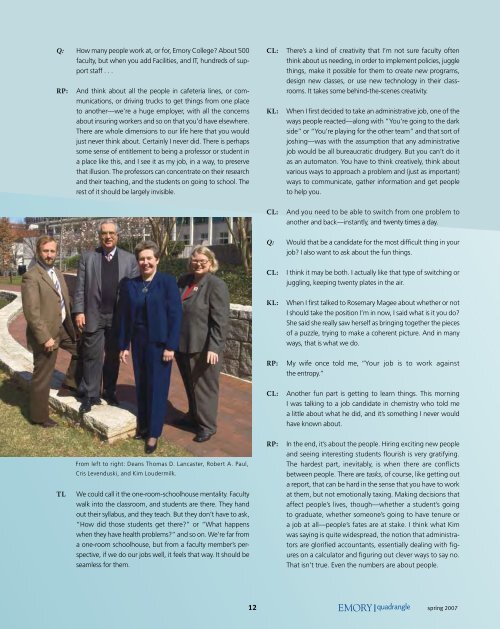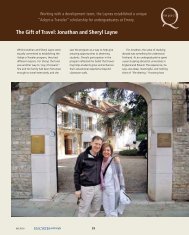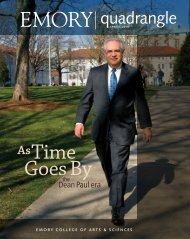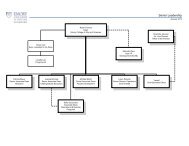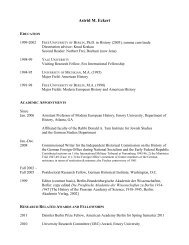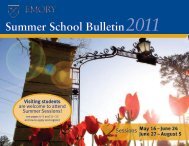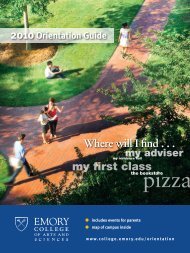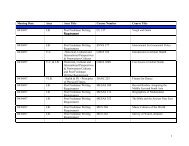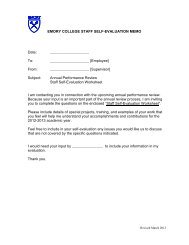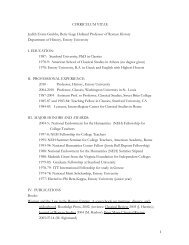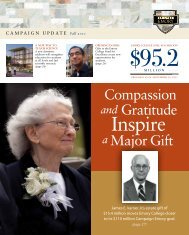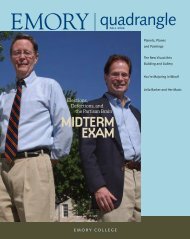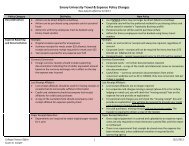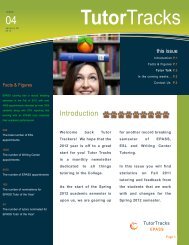quadrangle - Emory College - Emory University
quadrangle - Emory College - Emory University
quadrangle - Emory College - Emory University
You also want an ePaper? Increase the reach of your titles
YUMPU automatically turns print PDFs into web optimized ePapers that Google loves.
Q: How many people work at, or for, <strong>Emory</strong> <strong>College</strong>? About 500<br />
faculty, but when you add Facilities, and IT, hundreds of support<br />
staff . . .<br />
RP:<br />
And think about all the people in cafeteria lines, or communications,<br />
or driving trucks to get things from one place<br />
to another—we’re a huge employer, with all the concerns<br />
about insuring workers and so on that you’d have elsewhere.<br />
There are whole dimensions to our life here that you would<br />
just never think about. Certainly I never did. There is perhaps<br />
some sense of entitlement to being a professor or student in<br />
a place like this, and I see it as my job, in a way, to preserve<br />
that illusion. The professors can concentrate on their research<br />
and their teaching, and the students on going to school. The<br />
rest of it should be largely invisible.<br />
CL:<br />
KL:<br />
There’s a kind of creativity that I’m not sure faculty often<br />
think about us needing, in order to implement policies, juggle<br />
things, make it possible for them to create new programs,<br />
design new classes, or use new technology in their classrooms.<br />
It takes some behind-the-scenes creativity.<br />
When I first decided to take an administrative job, one of the<br />
ways people reacted—along with “You’re going to the dark<br />
side” or “You’re playing for the other team” and that sort of<br />
joshing—was with the assumption that any administrative<br />
job would be all bureaucratic drudgery. But you can’t do it<br />
as an automaton. You have to think creatively, think about<br />
various ways to approach a problem and (just as important)<br />
ways to communicate, gather information and get people<br />
to help you.<br />
CL:<br />
And you need to be able to switch from one problem to<br />
another and back—instantly, and twenty times a day.<br />
Q: Would that be a candidate for the most difficult thing in your<br />
job? I also want to ask about the fun things.<br />
CL:<br />
I think it may be both. I actually like that type of switching or<br />
juggling, keeping twenty plates in the air.<br />
KL:<br />
When I first talked to Rosemary Magee about whether or not<br />
I should take the position I’m in now, I said what is it you do?<br />
She said she really saw herself as bringing together the pieces<br />
of a puzzle, trying to make a coherent picture. And in many<br />
ways, that is what we do.<br />
RP:<br />
My wife once told me, “Your job is to work against<br />
the entropy.”<br />
CL:<br />
Another fun part is getting to learn things. This morning<br />
I was talking to a job candidate in chemistry who told me<br />
a little about what he did, and it’s something I never would<br />
have known about.<br />
TL<br />
From left to right: Deans Thomas D. Lancaster, Robert A. Paul,<br />
Cris Levenduski, and Kim Loudermilk.<br />
We could call it the one-room-schoolhouse mentality. Faculty<br />
walk into the classroom, and students are there. They hand<br />
out their syllabus, and they teach. But they don’t have to ask,<br />
“How did those students get there?” or “What happens<br />
when they have health problems?” and so on. We’re far from<br />
a one-room schoolhouse, but from a faculty member’s perspective,<br />
if we do our jobs well, it feels that way. It should be<br />
seamless for them.<br />
RP:<br />
In the end, it’s about the people. Hiring exciting new people<br />
and seeing interesting students flourish is very gratifying.<br />
The hardest part, inevitably, is when there are conflicts<br />
between people. There are tasks, of course, like getting out<br />
a report, that can be hard in the sense that you have to work<br />
at them, but not emotionally taxing. Making decisions that<br />
affect people’s lives, though—whether a student’s going<br />
to graduate, whether someone’s going to have tenure or<br />
a job at all—people’s fates are at stake. I think what Kim<br />
was saying is quite widespread, the notion that administrators<br />
are glorified accountants, essentially dealing with figures<br />
on a calculator and figuring out clever ways to say no.<br />
That isn’t true. Even the numbers are about people.<br />
12 spring 2007


